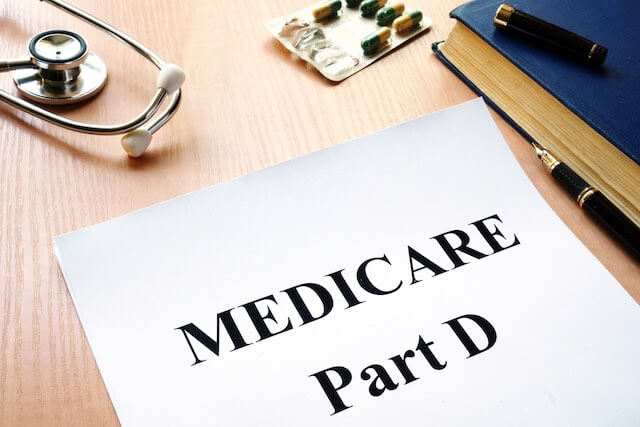Note: Please see the updated version of this article with more current information: Should Federal Retirees with FEHB Enroll in Medicare Part D?
People with Federal Employee Health Benefits program retiree benefits often wonder whether they should sign up for a Medicare Part D drug plan.
Part D is a voluntary prescription drug program for Medicare beneficiaries. It gives them access to retail outpatient prescription drugs at reduced rates. While Medicare Part B does cover inpatient medications and injectable medications administered in a doctor’s office setting, the coverage for outpatient medications didn’t exist until 2006.
Eligibility and Cost
To be eligible to enroll in a standalone Part D drug plan, a beneficiary must live in the plan’s service area and also be enrolled in either Medicare Parts A and/or B. Enrollees pay a monthly premium for this drug coverage that is set by the plan. There is usually a dozen or more standalone Part D plan options in each state every year, and premiums can range from as little as $10/month into well over $150/month, depending on the state and the drugs that the plan decides to include in its formulary.
While most enrollees pay just the plan premium for Part D, some enrollees will pay more because they are in a higher income bracket. Beneficiaries who filed individual taxes earning more than $85,000 or couples who filed jointly earning more than $170,000 will pay a fee that is referred to as an Income Related Monthly Adjustment Amount, which is just a nice way of saying you get to pay more for Part D because you earn more than most other people. You can learn more about these potential costs here.
Medicare Part D vs. FEHB
The reason that the Medicare Part D drug program is voluntary is that not everyone needs prescription drug coverage. FEHB retirees are a great example of this because the Office of Personnel Management has determined that the prescription medications coverage under the FEHB is, on average, as good as Medicare Part D.
This means that you don’t need to enroll in Part D and pay extra for your prescription coverage because your coverage with FEHB will be as good as or better than what you can get from Part D.
While you certainly can enroll in Part D if you really want to, there is no pressure to do so because OPM has deemed that your current coverage is comparable. It may not ultimately benefit you to also enroll in Part D because you would pay monthly premiums for a standalone Part D drug plan plus any calculated adjustments if you happen to be in one of those higher income brackets.
Now, because your FEHB coverage is considered creditable coverage, you will have the opportunity down the road to enroll in Part D without owing any late penalty as long as you have maintained that creditable FEHB coverage.
This changes if you leave or lose your FEHB coverage, so if for some reason that happens, be sure to enroll in a Part D drug plan within 63 days of losing your coverage so that you don’t face any penalties.
Medicare Advantage Plans
Lastly, we should mention that some Medicare beneficiaries choose to enroll in a Medicare Advantage plan that includes Part D. Some of these offer $0 premiums as well as additional benefits like Part B premium reduction, gym membership, or ancillary coverage for dental and vision care. Benefits are subject to change from year to year on all Medicare Advantage plans.
The OPM.gov website states that “when you enroll in a Medicare Advantage plan, you may not need FEHB coverage because the Medicare Advantage plan will provide you with many of the same benefits. You should review the Medicare Advantage plan benefits carefully before making a decision to suspend or cancel FEHB coverage.”
However, the OPM site also mentions that people who suspend FEHB coverage for an Advantage plan may re-enroll in FEHB if they later lose or cancel that plan.
Danielle K. Roberts is a Medicare insurance expert and co-founder of Boomer Benefits, a licensed insurance agency that helps baby boomers navigate Medicare.



